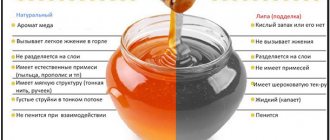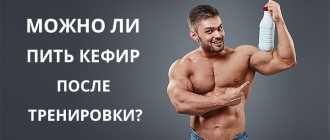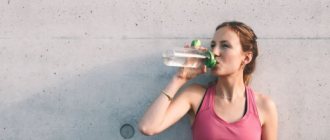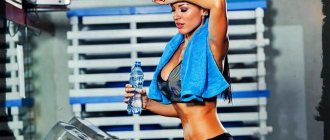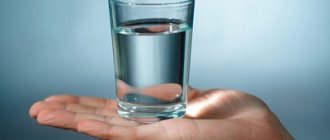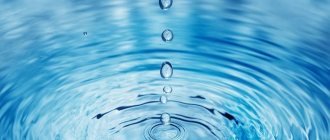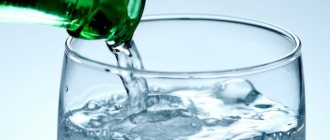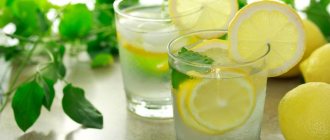When a person undergoes intense physical activity, he produces a lot of sweat, which leads to dehydration. This makes you feel very thirsty, but many professional athletes and doctors say that it is better not to drink water immediately after exercise. This article summarizes the pros and cons of why you shouldn’t drink water after a workout.
Is it possible or not?
After training, you need to quench your thirst, especially if you sweat a lot .
Some people are pleased to notice weight loss during exercise and are afraid to nullify all their efforts by quenching their thirst.
However, post-workout weight loss is mostly just dehydration, not fat loss.
Some trainers do not recommend drinking water after physical activity, due to the fear of severe stress on the heart, as well as the risk of developing a lack of sodium in the blood, especially in hot weather or in a stuffy room.
These tips relate more to the area of professional sports, where professionals can lose several liters of sweat during 4-6 hour workouts.
We recommend an article on the topic
Advice from coaches and instructors on whether you can drink water during training
NATA recommendations (from the book “Sports Nutrition for Winners” by S. Kleiner)[edit | edit code]
You can also follow the NATA (National Athletic Trainers Association) guidelines below.
Before training:
- 2-3 hours before the start of classes you should drink 500-700 ml of water or a sports drink.
- 10-20 minutes before the start of classes you should drink 200-300 ml of water or a sports drink.
During training
- Strength athletes will benefit in many ways by drinking water containing fast carbohydrates.
- If the activity lasts longer than 45 minutes or is intense, you should drink a liquid containing carbohydrates (sports drink) during the activity.
- A 6-8% carbohydrate solution maintains the optimal rate of carbohydrate processing.
- During exercise, when you require increased amounts of water, carbohydrate content should be kept to a minimum (less than 7%) to optimize fluid delivery.
- Liquids containing table salt increase thirst and forced fluid intake, and also compensate for weight loss.
- It is recommended to drink chilled drinks (temperature 10-15 degrees C).
- Drink 200-300 ml of water or sports drink every 10-20 minutes. Strength athletes should drink more, despite the lack of thirst.
After training
- Within 2 hours after exercise, drink enough water to replace any weight loss; Drink approximately 700 ml of water or sports drink per 0.5 kg of weight lost.
- Within 6 hours, replace the lost weight by 25-50% with liquid.
Why should you drink after exercise?
Drinking after training is necessary to restore the composition of the blood , which is approximately 50% water. A decrease in this ratio leads to a decrease in blood volume and disruption of its functions.
In a calm, sedentary state, thirst warns of the need to restore the balance of water in the body. For people who regularly sweat at the gym, this signal is less accurate.
The feeling of thirst is born in a special part of the brain - the hypothalamus, as a response to changes in the blood.
During training, a person becomes aware of thirst when he is already 1–2% dehydrated. This reduces activity during exercise and increases the body's recovery time.
Having reached 4-5%, dehydration causes weakness and apathy , inhibition of all body functions.
Most people only replace 50% of their water loss during physical activity, which is aggravated by the release of sodium, potassium, calcium, and magnesium through sweat.
Attention! After training, it is necessary to restore the water-salt balance without waiting for the feeling of thirst to appear.
Is it possible to drink water after training?
As already mentioned, the body is 80% water, and a loss of more than 20% of water is fatal. And here we come to the main question - is it possible to drink water after training? Oddly enough, there is no clear answer to this question, since it all depends on the conditions and goals of your training. If we are talking about drinking water immediately after finishing a workout, then yes, you can and even need to drink water if your workout is aimed at burning fat.
It has been scientifically proven that the lipolysis process requires water. If you do not drink water after such a workout, then the body goes into a state of shock and begins to break down fat to produce “natural” water. But when drinking water afterwards, the body will “deposit” the incoming water, resulting in the formation of swelling and stretch marks caused by water deposition. That is, a constant water balance must be maintained in the body.
And now, against the backdrop of all the above, let's figure out whether to drink water after training?
Yes, drink. But how much and when is determined by your individual parameters. If you are engaged in fat-burning workouts, then you need to drink both during and after training. Before undertaking any activity, check your body's water levels. For example, if you are a marathon or long-distance runner, then it is vital for you to drink during and after training, since the muscle mass of such a runner is minimal in relation to other athletes and the level of sweating and breathing is at a higher temporary level.
Why not?
Some sports and fitness trainers are of the opinion that you should not drink immediately after training and for an hour afterwards.
They explain this by the fact that people are able to drink at a faster rate than the excretory system works - at rest, the maximum ability of the kidneys to excrete urine is about 1 liter per hour, and during exercise this value naturally decreases by half.
Thus, the body replenishes fluid loss too quickly, which puts stress on the heart . Losing sodium through sweat makes the situation worse, especially during endurance exercise.
With a strong decrease in the concentration of this element in the blood, headache and nausea occur, and later disorientation, confusion, and convulsions may appear.
Important! In fact, cases of dehydration are much more common than low sodium in the blood or heart problems due to drinking water. Such situations happen among professional athletes, but during regular hour-long workouts in the gym, it is more important to restore the amount of water in the body.
After how long is it allowed?
It is necessary to compensate for 50-70% of water losses within the first two hours.
To do this, drink about 0.2 liters of water every 15-20 minutes. In the next four hours you need to make up the rest.
In case of heavy sweating, it is recommended to divide the portion of water into several doses, which helps to avoid unnecessary stress on the cardiovascular system and kidneys.
How much water to drink while dieting?
Experts say drinking when thirsty is not the best approach. Thirst signals that the body is already seriously suffering from dehydration. The best option is to regularly drink water according to the same pattern. It is recommended to drink 300-400 ml of water 1-2 hours before training, 10 minutes before training - 100 ml. During fitness, you need to take a few sips of water every 15 minutes. After classes, you need to drink 200-250 ml within 10-20 minutes.
It is important to understand that the calculations were made taking into account the normal air temperature in the gym. Fitness outside in cold or hot weather requires adjusting your drinking regime to the climatic conditions. General recommendations: when it’s hot, drink more water, when it’s cold, drink less.
Recommendations for quantity and composition
The main and only requirement for drinking water is purity and microbiological safety. Water from taps, as well as springs and wells, does not always meet the necessary requirements and often contains harmful bacteria and impurities. You can use bottled or filtered water.
Water temperature matters:
- hot - increases sweating and water loss;
- cold - keeps the body from overheating, but can cause vasospasm.
Both options are poorly suited for quenching thirst, since water is not absorbed in the stomach until it reaches a temperature of about 36-37 °C. The best option is lukewarm or room temperature water.
The thirst that appears during and after training cannot be relied upon. The best advisor is the numbers on the scales , from which you can calculate the amount of water needed to restore the body.
Reference! Conclusions about the degree of dehydration can also be made by observing the volume, color and smell of urine - a small volume of dark yellow color with a strong odor signals the need to restore the water-salt balance of the body.
Most people lose between 500 and 1,500 ml of sweat per hour of vigorous exercise, while during vigorous aerobic exercise the loss can be up to 4 liters.
To recover after physical activity, you need to drink 1.5 liters for every kilogram of body weight lost - 1 liter to compensate for sweating, the rest - based on water lost in urine.
Supplements
You can add lemon, honey, mint, berry or fruit juice to the water. In this case, it acquires some of the properties of sports drinks - it is enriched with electrolytes, carbohydrates and vitamins, which helps the body recover faster after training:
honey contains about 300 vitamins and minerals, as well as carbohydrates, which helps to quickly recover after physical activity;- berries and fruits make the drink tasty, contain useful substances, and also contribute to the rapid absorption of water in the stomach;
- mint has a positive effect on metabolism and helps relieve nervous tension;
- cucumber juice reduces appetite and is an excellent source of potassium;
- Rosehip contains a large amount of vitamins and minerals and has an anti-inflammatory effect.
Nonalcoholic beer
When?
After training.
Non-alcoholic beer, made from natural ingredients, without the addition of artificial flavors and colors, contains vitamins B1, B2, PP and the minerals calcium, magnesium, phosphorus, and potassium. In addition, it is lower in calories than fruit juices, has a pleasant beer taste and contains almost no alcohol. Non-alcoholic beer quenches thirst well and is refreshing.
Photo: Polina Inozemtseva - “Championship”
Therapist, TV presenter Alexey Bezymyanny
: “On top of that, non-alcoholic beer contains carbohydrates, making it a good post-workout energy drink. It is clear that you can drink non-alcoholic beer not before or during sports, but after, it is ideal to do this during the so-called carbohydrate window (the expected period of 35-40 minutes after intense physical activity).”
Interesting fact:
There is an opinion that beer is a fairly high-calorie product. Let's try to figure out if this is true? One can of non-alcoholic beer Baltika 0 (volume - 0.45 ml) contains only 158 kilocalories. Agree that if you drink non-alcoholic beer in reasonable quantities, then you can drink it without fear for your figure and health.
Non-alcoholic beer is suitable for those who want to gain weight. At the initial “loading” stage, you can include a soft drink in your diet. It is lower in calories than milk, soda or fruit juice. Among other things, B vitamins help restore the body after physical activity.
Other drinks
Water is the most readily available and cheapest way to replace water losses, but during vigorous exercise or activities in a hot room, drinks containing carbohydrates, vitamins and electrolytes will be more effective:
- Flavored and fortified drinks. They are lightly flavored water with a small amount of calories. Help restore water balance, stimulating thirst.
- Sports drinks . Effective for those who want to get the most out of every workout. The carbohydrates in a sports drink are used to provide energy to working muscles, while the electrolytes (sodium, calcium and magnesium) restore blood composition and help the body retain more water.
- Energetic drinks. Some sports drinks contain metabolic and exercise stimulants. Most often it is caffeine and taurine, but there may also be more exotic additives - ginkgo biloba, ginseng, guarana. Although they help extend the duration of active training, they should be used with caution, as energy drinks increase blood pressure, force the heart to work to the limit and increase water loss.
- Protein drinks. Various types of protein shakes and regular milk are designed primarily to stimulate muscle protein synthesis; they also contain electrolytes. These drinks are aimed at increasing muscle mass, but are also acceptable as restorers of water-salt balance.
